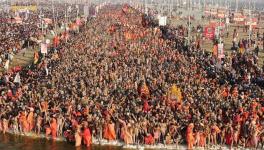Are Wheels Coming off the Indian Economy?
Demonetisation has vacuumed liquidity from a cash based economy that provides livelihood to more than half the population. Printing of 2,000 rupee notes was given priority so as to insert more cash in circulation. This has resulted in lack of liquid cash in the economy. Implemented under the pretense of curbing black money, demonetisation has proved to be a farce. With almost all the demonetised money back into banks, it seems that black money has vanished into thin air. The rationale behind this scheme is constantly being changed from stopping terror funding, to curbing black money, and now creating a digital economy. The government seems confused with the decision as well as its implementation. If things keep going at this pace, not only that the economy will shrink but GDP too, would go down.
Rough Transcript:
Prabir: Welcome to Newsclick. This program with Real news. We are going to discuss the effect of demonetisation , the black money hunt, as it has been portrayed by the government, and the possible impact on the economy. We have with us Shankar Raghuraman who is a senior economic journalist of the Times of India group. So what is really happening? What is the story? Why is there shortage of cash in the economy still?
Shankar: If you look at the statement they made, the one that you refer to about fifty percent of the cash having been brought back into circulation, it’s a very cleverly worded statement. What it says is that fifty percent of the cash because actually in circulation has been brought back. Now it is anybody’s estimate how much of the cash that was out there is really in circulation at any given point in time. So the estimate of the amount of money that was in the system in the form of 500 and 1000 rupee notes has been revised a little bit over time but the last figure we’ve heard is about 15.4 lakh crores. Now half of that would be 7.7 lakh crores. Whereas what the government is actually claiming is only 5 lakh crores having come back in the form of new currency notes. So that’s nowhere near fifty percent of what’s been taken out. But then if you say that all that 15 lakh crore - 4 lakh crores was actually just sitting at peoples’ home and never came out of their vaults, then you can make whatever assumptions you like about how much money was stacked away and correspondingly reduce your own target for how much money was needed to come back. Remember that by their own admission in the initial phase they have been focusing on getting out 2000 rupee notes, because they will be able to get a lot more of cash into the system quicker. But this can’t be sustained as they themselves said. They are now going to start focusing on the 500 rupee notes.
Prabir: Did it never strike the government that if you want to use the 2000 rupee notes effectively, you actually need 500 rupee notes otherwise it really doesn’t enter circulation?
Shankar: Well, it seems unbelievable that nobody in the government could figure that one out. It’s a plain commonsense that you can’t have a one is to twenty ratio between two consecutive notes. So if you take out the 500 rupee notes, you essentially have a 2000 rupee note and the next level is a 100 rupee note. I think part of the problem is also the obsession with secrecy. I suspect that very few people were in the know. So it is possible that if more people had been involved in planning this exercise, somebody would have had the commonsense to point out that you can’t have a system operating with only 100 rupee notes and 2000 rupee notes and with nothing in between.
Prabir: You were talking about it before we had the interview about the fact that we are now using our credit card for small value transactions. For the big value transactions we are using the 2000 rupee notes.
Shankar: It is exactly the opposite of what would normally have happened. Normally you use cash for small value transactions say buying a pack of cigarette, and use the credit card for larger transactions. But now because the 2000 rupee note seems pretty pointless, there’s hardly a place where you can get change for it, you use it wherever there is a large transaction and where you think you can get change for it.
Prabir: If circulation of money has dropped and with the 2000 rupee notes and 100 rupee notes what’s really happening is circulation of money is really slowing down. What is its likely impact on the GDP, particularly we take the.. if it is going to take at least another three months for the system to put back to put back the cash?
Shankar: First let me point out that the denominations are not the only thing reducing the circulation of money. The circulation of money is getting reduced also because of the normal reaction to any shortage of anything. If you believe something is in short supply, and you won’t be able to get hold of it in a hurry tomorrow, the natural tendency is to say let me keep some in reserve. So what this demonetisation has actually achieved is that in most honest tax payers’ homes there is a lot more cash today than was ever the case before the 8th of November. Because, it’s elementary commonsense again which as you say is rare. Let’s say, I have an emergency in the middle of the night, in a normal situation I would have said, ‘no problem, I would go to the nearest ATM and withdraw the money. But today, I know that I can’t do that. So I need to keep a stack of cash at home to protect myself against possible contingency. Now if you think of the arithmetic of it, you have a GDP of about 135 lakh crore which was operating on the basis of cash of about 19 odd like crore. So you have a 1:6; 1:6.5 kind of ratio between the GDP and the amount of cash.
Prabir: Which means each note was theoretically being used six times.
Shankar: If two things happen: one, the amount of money available goes down and (b) the number of times it goes around comes down, you can see the effect of that immediately. So, instead of 19 lakh odd crore going around six times, if you have say 14 lakh crore going around five times you immediately reduce the GDP by that point.
Prabir: So almost it by this calculation it would be thirty to forty percent reduction of the GDP.
Shankar: See, it would be any body’s guess how much the drop would actually be?
Prabir: Because, a lot of it is not cash.
Shankar: Yes. So those transactions would continue, but also what you are seeing right now are the first order effects. Right?
Prabir: Just take the issue of the GDP. About 40% of the transactions were in cash in the Indian economy. Would that figure be right?
Shankar: Roughly. Again these are estimates.
Prabir: These are estimates. So effectively, a sharp drop in those would have taken place. So which means that there is one level of chilling effect in terms of the transactions themselves becoming relatively much smaller. So that itself would be a 20% reduction for the first six months in the GDP if this continues.
Shankar: And one needs to remember that there is a distributional effect of this as well. Who are the people who are most affected by cash transactions coming now? Those who have no option but to deal in cash. Clearly that applies far more to the poorer sections than to people like you and me who have things like credit cards and debit cards which we use for things other than withdrawing money from ATMs. So, it is not only decline in overall economic activity , it is a decline in economic activity that particularly targets the poor.
Prabir: Instead of targeting the rich as Mr. Modi says, this seems to have at the moment targeted the poor much more.
Shankar: Absolutely.
Prabir: At the moment. But looking at the GDP effects which is also the second order effect, if for instance like shortage, if there is an expectation that there is going to be slow down on the economy than you don’t buy. Do you see, that effect also taking place?
Shankar: Absolutely. You don’t buy and because there is an expectation that there will be a slow down in the economy, companies don’t invest. They don’t anticipate future demands and therefore they don’t invest for that , and then it becomes a self fulfilling prophecy. If everybody holds back in the expectation that others will not spend, then of course it becomes a reality that the economy as a whole is spending a lot less.
Prabir: Do you think that this measure has in fact initiated a recessionary situation in the Indian economy?
Shankar: I think there is very little doubt about that, and there seems to be a popular misconception that this is a temporary problem just created by cash being in short supply at the moment, and the moment you have the cash back, things are going to get back to the normal. It doesn’t work like that. It’s like a … if you’ve got a car travelling on an express way at 200 km per hour and slam on the way and bring it to a dead halt, you aren’t going to go back to 200 km per hour the next second. It’s not going to happen. That applies as much to an economy.
Prabir: Last point; Mr. Jaitly our Finance Minister has been talking about how banks will be able to lend because they have more cash. Now assuming that people don’t take back the cash which they have deposited in the bank, even if making that assumption who is going to borrow if there is no demand in the economy?
Shankar: Absolutely. As I said, as an Industrialist if I believe that the demand for my goods is actually going to slacken and not improve, what am I borrowing for? What will I do with the money I borrow? I still have to pay interest on that money, and if I don’t expect any return on the money which is higher than the interest I will have to pay, I have no reason to borrow.
Prabir: Mr. Jaitly is a good lawyer, Mr. Modi may be a good administrator, but there doesn’t seem to be any willingness to listen to elementary economic wisdom. What do you think is happening in the government?
Shankar: We haven’t heard anything from the Economic Advisor, and it is amazing that something that involves such major changes in currency regulations you heard hardly anything from the governor of the Reserve Bank of India. Ultimately it is the Reserve Bank of which is responsible for regulating the supply of money. But you heard nothing from them. So yes, the sense one gets is that, let’s leave for the possible quality of advice they could have got aside for a moment, I don’t think that it would have mattered. Because I don’t think that anybody was in a mood to listen. I think these are decisions taken on the basis of political gambles. The economic rationale behind it is not particularly important. The fact of the matter is that if you look at the government’s own statements on the rationale behind this move, it’s changing by the day. It started off with the very first line of the RBI press release on the 8th of November and Prime Minister’s address to the nation spoke about terror funding, counterfeit money. It was supposed to be the death blow to those things. You don’t hear anything about it anymore! Then it turned out to be about curbing the black economy. Now you don’t even hear about that anymore. All we now hear about is digital and cashless. Well, people are cashless (laughs), that’s why they are in lines. Because they are cashless. I don’t know why he is exhorting them to become more cashless.
Prabir: In retrospect, this not only seems to be badly thought out, badly executed, but the continuous slew of notifications coming out seems to be, they really don’t know what they are doing, every day trying out something new.
Absolutely. The sense you get is that each day there is a knee jerk reaction to a specific crisis that they seem to have discovered that morning. You get up one morning and say, oh’ hang on, apparently it’s wedding season now. We need to do something about that. Then somebody else gets up and says that there’s sowing going on at the moment. Oh sowing? Then let’s allow old cash to be used for sowing. So on and so forth.
Prabir: Thank you very much Shankar. Any last words on the subject, what do you think this is going to turn out politically?
Shankar: The last word is going to be heard in UP and Punjab and I suspect it’s a last word which the BJP won’t particularly like.
Prabir: Thank you very much Shankar to have you with us, and we will come back to you on the issue of the digital economy.
Get the latest reports & analysis with people's perspective on Protests, movements & deep analytical videos, discussions of the current affairs in your Telegram app. Subscribe to NewsClick's Telegram channel & get Real-Time updates on stories, as they get published on our website.
























